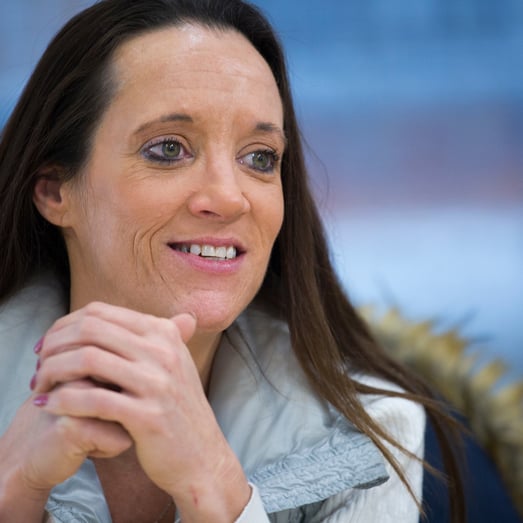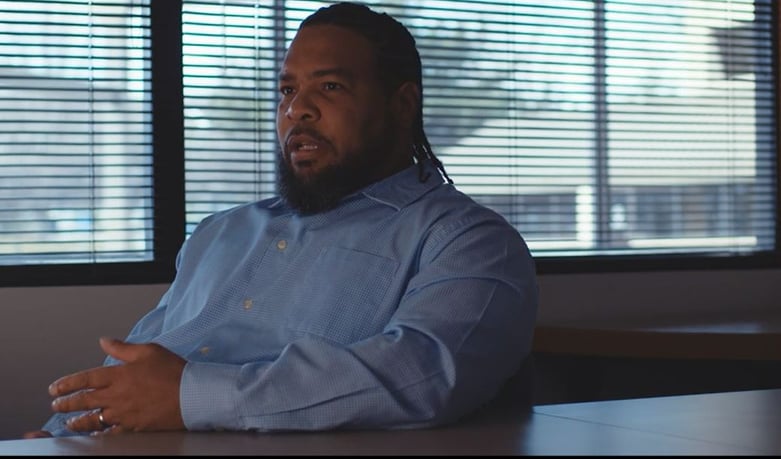Why hire someone with a criminal record?

Nearly every individual in prison today will eventually return to our community. Most are eager to rebuild their lives and achieve long-term financial stability, but they need support in finding a new path.
"If you don't do it for the people, do it for your family," says Brett Reyes, workforce advisor with Iowa Workforce Development, who helps those in prison build skills for future jobs. Supporting those who leave prison makes our communities safer by reducing the likelihood that they will commit another crime, and it makes our community stronger as more individuals move out of poverty.
Yet there are many barriers someone convicted of a crime faces when they return to our community, including finding affordable housing, connecting with a supportive community, accessing transportation or regaining a driver's license. Iowa ranks among the worst—37th out of 51 states (including District of Columbia)—for the number of barriers in place for ex-offenders.
Perhaps the biggest challenge: finding a job that offers a livable wage and establishes a foundation for long-term success. Iowa has 10 out of 10 potential roadblocks that keep ex-offenders from becoming employed, according to the Legal Action Center's analysis.
Click on the image below to hear firsthand from central Iowans who have been incarcerated about the challenges they face:
Here is why we need to work together to help someone with a criminal record get hired and find a path to financial stability. Also read an article recently published in the Des Moines Register.
We have a huge prison problem.
In 1972, fewer than 350,000 people were being held in prisons and jails nationwide. Today, more than 2 million are being held. The United States has 5 percent of the world's population, but 25 percent of the world's prisoners.
As a result, state and federal corrections budgets have increased by 305 percent over two decades. The corrections budget is the second fastest growing budget in Iowa behind Medicaid. Each person incarcerated costs the American taxpayer an average of $31,000 a year.
The prison problem is a discrimination problem.
African Americans are nearly six times more likely and Latinos are nearly twice as likely to be incarcerated than white Americans. In fact, the U.S. incarcerates a larger percentage of its African American population than South Africa did at the height of apartheid.
Some point to the War on Drugs as the reason for increased incarceration, but studies confirm that people of all demographics use and sell drugs at similar rates. Yet in major cities, as many as 80 percent of young African American men now have criminal records and, as a result, will face a series of roadblocks throughout their lives.
Without a job, ex-offenders cannot succeed in life.
One year after release, up to 60 percent of people convicted of a crime are not employed, according to the National Institute of Justice. Iowa is among the worst for keeping those convicted of a crime from getting a job. Among the challenges: employers and occupational licensing agencies can ask about arrests that never led to conviction and refuse to hire or license anyone with a criminal record no matter their qualifications.
Many ex-offenders talk about being offered a well-paying, full-time job after going through the interview process and then having that offer taken away once a background check is completed. As a result, many are stuck in a series of part-time or minimum-wage positions or fall back into criminal habits to make enough to survive. More than two-thirds of those released from state and federal prison will be re-arrested for a felony or serious misdemeanor within three years.
Meanwhile, employers need to fill positions.
Iowa has an acute worker shortage. 55 percent of all jobs in central Iowa require some post-secondary education up to an associate's degree, and only 32 percent of the workforce has the right skills for these jobs (Iowa Workforce Development, 2015). Meanwhile, approximately 5,000 men and women are released from Iowa prisons each year. With proper training, education, and supportive services, these individuals could fill some of those vacancies.
This recent New York Times article talks about why some employers are hiring convicted felons, even while they're in prison.
Children of incarcerated parents are likely to follow.
A prison sentence is not just something that impacts one individual; it changes entire families. More than half of all incarcerated adults are parents to children under age 18. Incarceration of a parent leads to instability in a family, emotional trauma for children, and increased likelihood that families will live in chronic poverty.
An Iowa study shows that 85 percent of adults who reported growing up with an incarcerated family member experienced other types of childhood trauma. 70% of children with an incarcerated parents will follow in their parents' footsteps.
What can we do to address this issue?
If you are an employer, consider why you should hire someone with a criminal record, especially if they meet your qualifications and performed well in the interview. Central Iowa Works works with those in the prison system or convicted of a crime to gain skills and training that can fill needed positions.
If you want to work to address this issue in central Iowa, join the OpportUNITY task force on re-entry that is using a multifaceted approach to connect ex-offenders with employers, support them as they deal with their childhood trauma, and promote a legislative agenda to make it easier for those who have been incarcerated to contribute to society and avoid returning to prison.
Click below to learn more about how we can all fight poverty together through United Way of Central Iowa's OpportUNITY initiative.
CTA Headline Goes Here Lorem Ipsum Dolor Sit Amet
Lorem ipsum dolor sit amet consectetur. Quis congue varius a.



